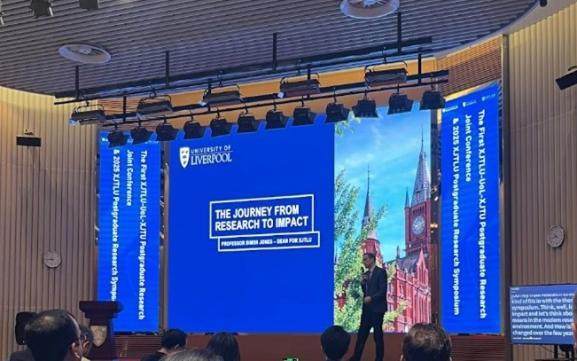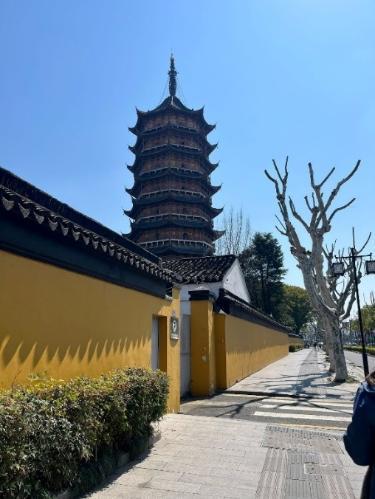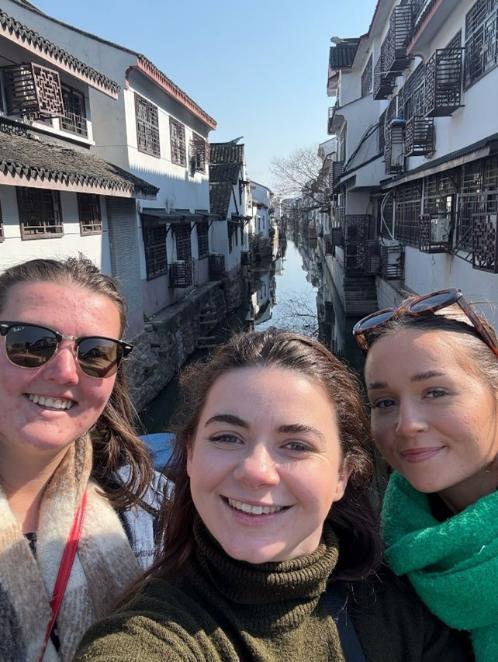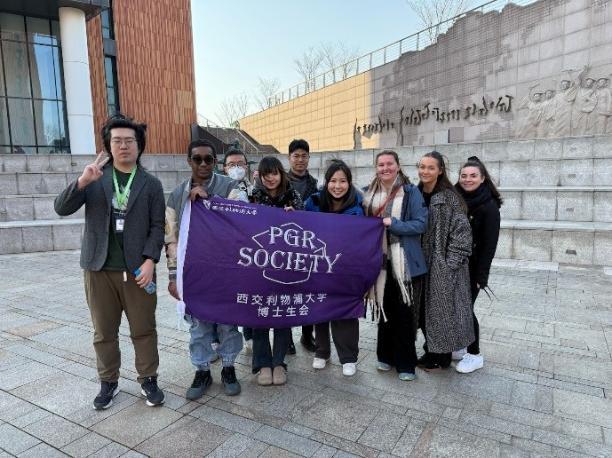XJTLU-UoL-XJTU Postgraduate Research Joint Conference
Malika Ben Kahla, Izzy Kevan, and Kate Williams were co-leads of the PGR-DevNet (now called the PDG) from 2023 to 2025. Here, they share their reflections on their trip to the first XJTLU-UoL-XJTU Postgraduate Research Joint Conference in Suzhou, China.
As members of the Postgraduate Researcher Development Network (PGR-DevNet) at the University of Liverpool, we were invited to attend the first XJTLU-UoL-XJTU Postgraduate Joint Research Conference at X’ian Jiaotong-Liverpool University located in Suzhou, China. This was an amazing opportunity to experience a different research culture, network with fellow PGR students undertaking the same journey as ourselves, and to present our research findings to an international audience. It also offered the chance to experience a country that none of us had visited - China!
We stayed on the XJTLU campus and so were able to fully experience and enjoy the area as a local student would - visiting many of the local coffee shops, eateries and buildings. We were offered the opportunity for a campus tour and introduced to members from the PGR Society at XJTLU, including Medhav (PGR society president) who were wonderful hosts and facilitated interesting discussions on PGR events that they plan, and how our respective experiences and expertise could be incorporated.

What were your highlights?
One of the highlights of the conference was the poster session, where the full range of research conducted at XJTLU was put on display, with topics such as the use of social media in marketing, structural stability, and use of AI to detect cancer. It was fascinating to get to network with students from such different backgrounds and research interests, which often is not possible normally. Another highlight of the conference was the award ceremony which was hosted on the Friday evening by two of the XJTLU PGR students, where awards were presented to students for the best poster and oral presentation within each area of research. One of our own students, Yuchen Su, won an award for her poster on ”Heterogeneous agents and money demand in micro-founded model”.
Outside of the conference, we had the opportunity to experience the city of Suzhou. We took the metro to the city centre, and navigated a number of temples and gardens, as well as visiting Shangtang Street (one of China’s National Historic and Cultural Streets). We also visited Suzhou Centre, a large shopping-centre situated on the shores of Jinji Lake with amazing views back towards the XJTLU and Suzhou Industrial Park. This area was particularly amazing in the evening, when the Gate of the Orient Building is lit up and displays amazing images from other areas of Suzhou.

What was the most challenging thing during the trip?
While the experience of travelling to China and attending the conference was unforgettable, it certainly came with its fair share of challenges. The journey itself was a test of endurance—17 hours each way, with layovers and time zone shifts that left us more than a little disoriented on arrival. But it was the shift in everyday infrastructure that was particularly striking. In Suzhou, we found ourselves navigating a payment system that operates almost entirely through mobile apps. The reliance on a strong phone signal and digital wallets like Alipay was something we hadn’t anticipated, and trying to set up and use the app—often without English translations—proved to be an unexpected but necessary learning curve. We were quickly reminded of how integral technology has become to everyday life in China, and just how differently systems operate in comparison to the UK.
The scale of the symposium itself was another eye-opener. With over 400 presentations spanning multiple disciplines, it was a real challenge to orient ourselves amidst such an ambitious programme. As a first-time attendee of an international conference, I found the sheer variety of sessions both exciting and overwhelming. Selecting which talks to attend often meant choosing between equally fascinating topics, and the pace of the schedule left little room to pause and reflect. Yet despite these challenges, the experience was undeniably enriching—pushing us to adapt quickly, engage deeply, and immerse ourselves in a vibrant and fast-paced academic environment.

What were your perceptions of XJTLU University?
Walking onto the XJTLU campus it felt surreal at times, the environment has been cleverly designed to transcend elements of this joint venture between Xi'an Jiatong University and University of Liverpool. XJTLU is positioned in a prime location as the main base in the Suzhou Industrial Park area of Suzhou. The campus is split into the North and South sections.
The North campus boasts striking buildings, including the central building where you can find a hub of activity. The South campus is organised around a focal point with buildings for research, teaching and academic exchange. We were totally impressed at the scale and organisation of the symposium. We could see how the ideas of ‘HeXie’ (the symbiotic relationship between humans and systems to approach the UACCS world we live in) lived in the culture of postgraduate students and staff, and observed a research culture focused on producing excellence towards publication in prestigious environments. I don’t think we have ever attended an event that displayed so many posters (over 400!) and the oral presentation sessions were.
